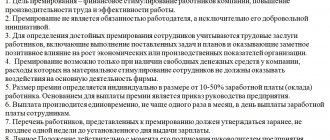In my practice, I quite often came across a situation where employees were not paid a bonus for the reason that they did not fully work the period for which the bonus was paid (they were sick, were on a business trip, etc.). Especially often, a bonus is not paid to dismissed employees.
But non-payment of a bonus, if it is a component of wages, is nothing more than incomplete payment of wages on time. Responsibility for this violation is established by Art. 5.27 Code of Administrative Offenses up to 50 thousand rubles, and Art. 145.1 of the Criminal Code of the Russian Federation provides for a fine of up to 120 thousand rubles. or imprisonment for up to one year.
Let's take a closer look at what a premium is?
Bonus as part of salary
Art. 129 of the Labor Code of the Russian Federation states that the bonus is an incentive payment that is included in the salary. Thus, if the bonus is prescribed in the internal regulations of the organization, then the employer must pay it without fail. But if you look from the other side, a bonus is an incentive, and incentives are a voluntary right, and not at all an obligation, as Art. 22 and 191 of the Labor Code of the Russian Federation.
If bonus payment is the responsibility of the employer, then certain conditions must be met to deprive the bonus. If this is a free right, then at the will of the authorities the bonus can be canceled at any time.
In what cases can an employee be deprived of a bonus ?
This issue is resolved by the wording in the Regulations on bonuses adopted in a particular organization.
IMPORTANT! Deprivation of bonuses as a disciplinary action cannot be used, since the Labor Code does not contain this type of penalties, as well as federal legislation, charters, administrative code, etc. The employer does not have the right to establish this type of punishment in local legal acts.
Regulatory framework
Bonus funds are received in conjunction with other forms of payment, including salary.
Deprivation of additional remuneration is possible only under circumstances prescribed by law. Important! Deprivation of bonus funds is not considered a disciplinary sanction, which makes it possible to apply several options for punishment for significant offenses. This point is regulated by Article 191 of the Labor Code of the Russian Federation.
A bonus is considered an incentive, so the employer, if there are specified grounds in the form of a serious violation, has the right to reduce the payment or remove it. This procedure requires the preparation of all necessary documentation and a proven fact of violation. If there are no grounds for reducing payments, then the manager’s actions will be considered illegal.
Legislative grounds:
- violation of labor discipline, in particular being late for work or leaving ahead of schedule;
- systematic failure to fulfill obligations related to the job description or employment contract;
- systematic performance of work with unsatisfactory results;
- absenteeism;
- intentional damage or material damage to the organization caused by an employee.
In all cases, the fact of violation itself must be proven and registered using special documents.
Article 191 of the Labor Code of the Russian Federation “Incentives for work”
Legal or not
According to Article 192 of the Labor Code of the Russian Federation, the manager determines the possibility of receiving remuneration or depriving it. If the elimination of additional funds is carried out in accordance with the proven grounds prescribed in the Labor Code of the Russian Federation, then there are no inconsistencies. In other cases, the action is illegal. It is also impossible to deprive a bonus for a minor offense that is not prescribed by law or in a local act. For example, failure to comply with the dress code cannot be used for such a process.
Important! Local acts must contain the possibility of depreciation. Without them, a reduction in established payments is impossible.
Article 192 of the Labor Code of the Russian Federation “Disciplinary sanctions”
What is written in the documents?
The wording of the Bonus Regulations and the employment contract is key to considering the reverse procedure. Let's look at the possible options and their consequences for employees.
- Composition of wages. If the employee’s contract states that the salary consists of salary, allowances and bonuses, this means that the latter is part of the basic income, and not an incentive additional payment to it. The employer is obliged to pay wages in full. Therefore, it has no right to reduce the size of the bonus and deprive the employee of part of his earnings.
- The premium is variable. The documents highlight a constant element of salary (salary and, possibly, allowances) and a variable element - actually, a bonus. Here the conditions on which the variable part of the salary depends must be indicated - a reference to the bonus regulations or other local act is acceptable. In this case, under negative circumstances for the employee, we are not talking about deprivation of the bonus, but simply about non-accrual.
NOTE! Since non-payment of a bonus is not a punishment, of which there cannot be several for one offense, disciplinary action may well be applied simultaneously with the deprivation of a bonus - for example, a reprimand or warning.
Who should not be deprived
At the legislative level, there are categories of workers who are prohibited from being deprived of bonuses. It is believed that an employer cannot impose several disciplinary measures against an employee. For example, it is prohibited to deprive an employee of a bonus and impose an additional fine.
Sometimes management deprives an employee of bonuses only because he came to work in clothes that do not comply with the dress code. Such actions by management are considered illegal.
A person's clothing cannot in any way affect the quality of the work performed. Of course, if a special form is not provided for by safety regulations. It is the right of the employer to assign or deny a bonus. There are no clearer deprivation rules.
Pros and cons of bonus stimulation
The bonus reduction system is imperfect, however, the relative success of its functioning proves the effectiveness of such enforcement measures. Naturally, subject to compliance with labor laws.
Contradictions in depreciation:
- Having made mistakes, the employee cannot correct them in order to avoid deprivation of bonuses;
- in the case of non-specific wording in the documentation, the manager’s hands are too free (for example, the award of a bonus “for high performance” can easily be revised);
- indicators must correspond to the current level of development of the enterprise and are periodically reviewed and updated.
Positive aspects of depreciation:
- the responsibility of both parties increases: both employees and management;
- labor discipline receives an additional incentive to comply;
- the possibility of a differentiated approach to financial motivation.
Negative aspects of depreciation:
- possible mistrust of management;
- the pain of financial deprivation;
- work for results at the expense of the personal factor;
- additional ground for conflict situations.
Question: Does the employer have the right not to charge (reduce) a bonus depending on the type of disciplinary sanction applied to the employee (remark, reprimand)? How can this be done? View answer
Correct employer behavior
If management plans to use bonuses as a motivational factor, legal regulations should be followed.
Is it legal to deprive an employee of his bonus when reprimanding him for a disciplinary offense ?
What is the penalty for illegal deprivation?
Illegal deprivation of a bonus or reduction in its size may well become a reason for legal proceedings and the imposition of a serious fine on an overly zealous employer:
- for a boss, individual entrepreneur – 1-5 thousand rubles;
- per company – 30-50 thousand rubles; (Article 5.27 of the Code of Administrative Offenses of the Russian Federation).
If this is not the first time this has happened, then you can receive not only a monetary penalty, but also disqualification:
- director, chief - from 10 to 20 thousand rubles. or disqualification for 1-3 years;
- individual entrepreneur – 10-20 thousand rubles;
- legal entity – 50-70 thousand rubles.
In this case, the employee’s fault is not taken into account. The legality of the deduction of bonuses is established by documents: if the bonus is issued as part of the salary, it is illegal to deprive it.
Conditions and procedure for legal depreciation
- The wording in the text of employment contracts states that the bonus is a variable part of the salary.
- The Regulations on Bonuses adopted by the enterprise, which clearly define the conditions for accrual, reduction and deprivation of bonuses.
- The bonus is accrued by order of management, as well as reducing its size or not accruing.
- If the text of the Bonus Regulations states that bonuses are not awarded for disciplinary offenses, then a reduction or withdrawal of the bonus can be made only after a violation has been recorded or a disciplinary sanction has been imposed, which will prove the employee’s guilt.
- If the penalty that became the basis for depreciation is lifted, there is no basis for subsequent payment of the bonus. A penalty is a punishment for an offense, deprivation of a bonus is its consequence, and the removal of a penalty is the result of the employee’s subsequent merits.
- If disciplinary action, which resulted in a deprivation of bonuses, was applied illegally and was subsequently appealed and withdrawn, then the employee has the right to demand the cancellation of the decision on depreciation.
Question: An employee-driver caused an accident during working hours and left the scene of the accident, for which he was subjected to administrative arrest. Can the employer also impose a disciplinary sanction on him for this, as well as deprive him of his bonus? View answer
Withholding the amount of additional incentive
When registering a bonus separately from the salary, that is, in the form of an additional incentive, it is allowed to deprive the employee who committed the violation of this type of incentive by order.
The law does not stipulate the subtleties of drawing up this document, which is why management often makes obvious mistakes when developing it. The order to deprive an employee of additional remuneration must include the following information:
- the grounds on which additional remuneration should be accrued;
- reasons for depriving an employee of remuneration. It is important to consider that the reason for refusing to pay a certain amount must be compelling and relate to the activities of the organization as a whole.
- references to legislative acts authorizing the employer to use this method of recovery;
- full name of the organization indicating its legal and physical address, as well as its form;
- data of the employee subject to recovery;
- employee position indicating the unit or department;
- if a fact arises that leads to the application of penalties during the period when the offending employee replaces another employee, this circumstance must be documented;
- the amount of monetary allowance that the employee is deprived of (in words).
To get a more complete picture, it is necessary to reflect in the document the applied legislative acts or clauses of the company’s internal documents. The head of the company gets acquainted with the document after it has been checked by a competent employee, in particular the company’s lawyer. After approval, the order is subject to demonstration to the employee subject to the penalty. According to the rules of document flow, a copy of this order is made, which is attached to the employee’s personal file, the original is archived and stored for the period required by law.
Order on dismissal of an employee
It is better not to name this order in this way, because legally “de-bonus” is the cancellation of the accrual of bonuses, and with the legal application of this motivational influence we can only talk about non-accrual or a reduction in its size. To avoid ambiguity, the order should not use words that can be interpreted as punishment: “withdrawal”, “deprivation”, “about, etc. Instead, it is worth using neutral terms “reduction in size”, “non-accrual”, “failure to achieve indicators”, etc.






